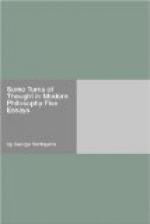Not only is infinite Being an incongruous and obstructive term to describe the substance of the world (which, if it subtends the changes in the world and causes them, must evidently change with them), but even mathematical space and time, in their ideal infinity, may be very far from describing truly the medium and groundwork of the universe. That is a question for investigation and hypothesis, not for intuition. But in the life of intuition, when that life takes a mathematical turn, empty space and time and their definable structure may be important themes; while, when the same life becomes a discipline of the affections, we see by this latest example, as well as by many a renowned predecessor of M. Benda, that infinite Being may dominate the scene.
Nor is this eventual dominance so foreign to the natural mind, or such a miraculous conversion, as it might seem. Here, too, there is no derivation of object from object, but an alternative for the mind. As M. Benda points out, natural interests and sympathies may expand indefinitely, so as to embrace a family, a nation, or the whole animate universe; we might even be chiefly occupied with liberal pursuits, such as science or music; the more we laboured at these things and delighted in them, the less ready should we be for renunciation and detachment. Must conversion then descend upon us from heaven like a thunderbolt? Far from it. We need not look for the principle of spiritual life in the distance: we have it at home from the beginning. Even the idea of infinite Being, though unnamed, is probably familiar. Perhaps in the biography of the human race, or of each budding mind, the infinite or indeterminate may have been the primary datum. On that homogeneous sensuous background, blank at first but secretly plastic, a spot here and a movement there may gradually have become discernible, until the whole picture of nature and history had shaped itself as we see it. A




